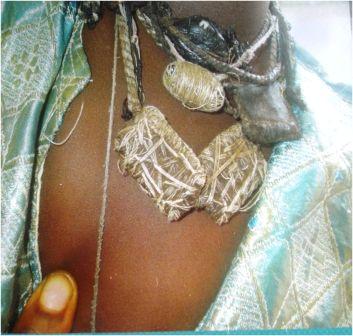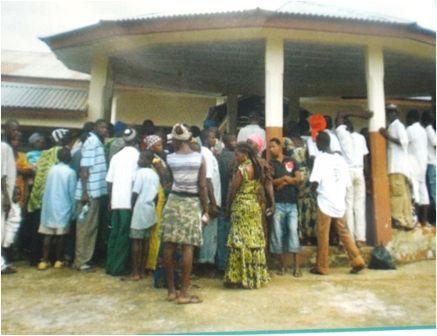Traditional Beliefs Of Epilepsy In Sierra Leone
An holistic health research carried out by Epilepsy Association of Sierra Leone (EASL) in 2013 has revealed that Traditional Beliefs and Epilepsy in Sierra Leone is worst than any other country due to the fact that Sierra Leone have some of the poorest health indicators in the world , including high maternal and infant mortality rates couple with acute poverty. (Photo: A young epilepsy patient wearing a necklace charm which is thought to drive away evil spirits and the epilepsy )
According to the research, in its 2002 Health Policy Paper the Government of Sierra Leone has stated its commitment to strengthen curative medicine for epilepsy patients. But however, the country’s health service infrastructure requires so much support at all levels and that it cannot priorities conditions such as epilepsy – although this is an important cause of morbidity, unemployment, poverty and above all stigma especially for women and girls.
In response to this, Dr.Radcliffe Lisk, a Consultant Neurologist at Basildon & Thurrock NHS University Hospitals in England with the help of UK Charity Medical Assistance to Sierra Leone in collaboration with the Epilepsy Association of Sierra Leone start the first structured and resourced epilepsy service in the country adding that in Sierra Leone people with epilepsy are less likely to receive an education or to generate a living income and that are more likely to live in extreme poverty due to misunderstanding about the condition, its causes and how it may be treated often leads to discrimination.
However, the research also gives historical overview of epilepsy which states that, the oldest detailed account of epilepsy dated as far back as 2000 BC and that the word epilepsy is derived from a Greek word epilepsia which means to hold something or to seize. It was, and is still, widely believed that a person with epilepsy is seized by a supernatural force or power and therefore the word seizure is now mostly used to describe fits, attacks, or convulsions, a period of abnormal physical reaction or behavior.
However, there was a revolutionary view by Hippocrates, the father of medicine, who believed that epilepsy was not sacred but a natural disorder of the brain which he said; he didn’t believe that a human being can be invaded by a spirit and therefore recommended physical treatment and that this view took root in the 18th to the 19th Century.
The research went further to state that, up to this time now people with epilepsy were viewed with fear, suspicion, misunderstanding and discrimination. They were treated as outcasts and punished, though some succeeded and excelled, like Julius Caesar and Pope Pius the 9th.
It also revealed that, as Neurology emerged as a discipline in the 19th Century it helped to reduce the misunderstanding associated with the disorder or infirmity, especially when bromide was introduced as the first effective anti-epileptic drug in 1857, phenobarbitone in 1912 and phenytoin in 1938.
In this regards, the research also question how common is epilepsy in the country? The response was that epilepsy rates are substantially higher in African countries like Sierra Leone than in Western European countries due to a range of factors including birth trauma, cerebral malaria, the consequences of meningitis, as well as injuries relating to the country’s ten years civil war.
On the other hand, the research also reveals that, there are no national studies on epilepsy prevalence but local studies suggest rates in excess of 1%, equating to over 60,000 people nationwide. This exceeds the prevalence of AIDS. These patients though are rarely seen in healthcare settings due to the stigma of the condition and that the scale of the need is huge. Clinics now held in all districts of the country continue to attract dozens of patients and the first clinic held in Bo town was attended by 382 patients who completely overwhelmed the facilities. A recently opened clinic in Pujehun also registered over a hundred patients in just two months.
Finally the research also disclose the Traditional Beliefs and Epilepsy in Sierra Leone which state that, Epilepsy has been identified in Sierra Leone prior to the colonial era but with very little understanding of the illness. To date few medications are available and sufferers are often socially excluded from their communities to devastating effect.
In Sierra Leone, the causes of epilepsy are misunderstood to be demonic, witchcraft or atonement for sins committed by one’s forefathers; it is further believed that people are possessed by supernatural forces which render them incapable of controlling their bodily functions and that the condition is transferable through contact with frothy sputum that comes out of a person’s mount during seizures.
The research also states that, over half of the Sierra Leonean population have the believe that epilepsy is due to witchcraft or demons or both and two-thirds have tried traditional healing while a quarter seek faith healing. The condition is called by different names in Sierra Leone depending on the tribal origin. The Kroo call it ‘fix’, Temne call it ‘katuk’, and Mende call it ‘kpogboni’ and so on.
Because of the perception of witchcraft and demons as a cause of epilepsy is common among Sierra Leoneans, the treatment is never considered to be scientific but a job for traditional healers who employ herbal remedies, rituals, spiritual curse or combination of all these. Some methods used to cure epilepsy can result in long-term health complications, for example, scarification of the body using unsterilized sharp piercing instruments may lead to infections including tetanus. Certain ‘treatments ‘involve intense fumigation when fumes from a boiled mixture of herbs are inhaled, often leading to respiratory complications. Some of the oral concoctions have been known to be toxic, leading to serious gastrointestinal symptoms.
This manual research would not have been possible without the support of Tropical Health & Education Trust (THET-UK), Comic Relief (UK) and Medical Assistance Sierra Leone (MASL-UK).And also huge contributions from the Epilepsy Association of Sierra Leone include the chapters on history of epilepsy, traditional beliefs, the plight of people with epilepsy in Sierra Leone and epilepsy & women and that their contributions were highly appreciated.
By Alhassan Bangura
Stay with Sierra Express Media, for your trusted place in news!
© 2018, https:. All rights reserved.







